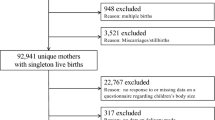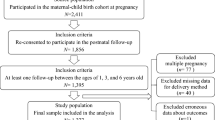Abstract
We examined the relationship between cesarean section (C-section) and the risk of overweight and obesity in children in grade 6 (mean age, 11.92 years; standard deviation = 0.34). Data from phase I through phase III of the National Institute of Child Health and Human Development Study of Early Child Care and Youth Development were used. Children with complete data from 1991 through 2004 were included in this study (n = 917). Multiple logistic regression analyses were used to adjust for potential confounding and to evaluate the association of C-section and childhood overweight and obesity. Compared to children delivered vaginally, children delivered by C-section had approximately twice the likelihood of being overweight (odds ratio (OR) = 1.86, 95 % confidence interval (CI) = 1.27–2.73) or obese (OR = 1.87, 95 % CI = 1.19–2.95). However, when examined according to sex, males delivered by C-section had an increased risk for being overweight (OR = 1.78, 95 % CI = 1.01–3.12) and obese (OR = 2.58, 95 % CI = 1.36–4.88), while females had an increased risk only for being overweight (OR = 1.99, 95 % CI = 1.17–3.39). Conclusion: C-section was associated with an increased risk of overweight and obesity in children in grade 6, but the relationship differed according to gender. Further longitudinal studies are warranted to examine the long-term effect of delivery mode on the risk of childhood overweight.
Similar content being viewed by others
Abbreviations
- CATCH:
-
Child and Adolescent Trial for Cardiovascular Health
- CDC:
-
Centers for Disease Control and Prevention
- CI:
-
Confidence interval
- C section:
-
Cesarean section
- NICHD:
-
National Institute of Child Health and Human Development
- OR:
-
Odds ratio
- SAPAC:
-
Self-Administered Physical Activity Checklist
- SECCYD:
-
Study of Early Child Care and Youth Development
References
Agras WS, Hammer LD, McNicholas F, Kraemer HC (2004) Risk factors for childhood overweight: a prospective study from birth to 9.5 years. J Pediatr 145:20–25
Ajslev TA, Andersen CS, Gamborg M, Sørensen TI, Jess T (2011) Childhood overweight after establishment of the gut microbiota: the role of delivery mode, pre-pregnancy weight and early administration of antibiotics. Int J Obes 35:522–529
Barros FC, Matijasevich A, Hallal PC et al (2012) Cesarean section and risk of obesity in childhood, adolescence, and early adulthood: evidence from 3 Brazilian birth cohorts. Am J Clin Nutr 95:465–470
Betrán AP, Merialdi M, Lauer JA et al (2007) Rates of caesarean section: analysis of global, regional and national estimates. Paediatr Perinat Epidemiol 21:98–113
Cardwell CR, Stene LC, Joner G et al (2008) Caesarean section is associated with an increased risk of childhood-onset type 1 diabetes mellitus: a meta-analysis of observational studies. Diabetologia 51:726–735
Centers for Disease Control and Prevention (2011) National diabetes fact sheet: national estimates and general information on diabetes and prediabetes in the United States. U.S. Department of Health and Human Services, Atlanta
Daniels SR, Arnett DK, Eckel RH et al (2005) Overweight in children and adolescents: pathophysiology, consequences, prevention, and treatment. Circulation 111:1999–2002
Decker E, Engelmann G, Findeisen A et al (2010) Cesarean delivery is associated with celiac disease but not inflammatory bowel disease in children. Pediatrics 125:e1433–e1440
Flegal KM, Carroll MD, Ogden CL, Curtin LR (2010) Prevalence and trends in obesity among US adults, 1999–2008. JAMA 303:235–241
Freedman DS, Khan LK, Serdula MK et al (2005) The relation of childhood BMI to adult adiposity: the Bogalusa Heart Study. Pediatrics 115:22–27
Freedman DS, Zuguo M, Srinivasan SR, Berenson GS, Dietz WH (2007) Cardiovascular risk factors and excess adiposity among overweight children and adolescents: the Bogalusa Heart Study. J Pediatr 150:12–17
Gillman MW, Rifas-Shiman SL, Kleinman K, Oken E, Rich-Edwards JW, Taveras EM (2008) Developmental origins of childhood overweight: potential public health impact. Obesity (Silver Spring) 16:1651–1656
Goldani HA, Bettiol H, Barbieri MA et al (2011) Cesarean delivery is associated with an increased risk of obesity in adulthood in a Brazilian birth cohort study. Am J Clin Nutr 93:1344–1347
Grönlund MM, Lehtonen OP, Eerola E, Kero P (1999) Fecal microflora in healthy infants born by different methods of delivery: permanent changes in intestinal flora after cesarean delivery. J Pediatr Gastroenterol Nutr 28:19–25
Hamilton BE, Martin JA, Ventura SJ (2010) Births: preliminary data for 2009. National vital statistics report. National Center for Health, Hyattsville
Huh SY, Rifas-Shiman SL, Zera CA et al (2012) Delivery by caesarean section and risk of obesity in preschool age children: a prospective cohort study. Arch Dis Child 97:610–616
Huurre A, Kalliomaki M, Rautava S, Rinne M, Salminen S, Isolauri E (2008) Mode of delivery effects on gut microbiota and humoral immunity. Neonatol 93:236–240
Kalliomäki M, Collado MC, Salminen S, Isolauri E (2008) Early differences in fecal microbiota composition in children may predict overweight. Am J Clin Nutr 87:534–538
Kamath BD, Todd JK, Glazner JE, Lezotte D, Lynch AM (2009) Neonatal outcomes after elective cesarean delivery. Obstet Gynecol 113:1231–1238
Krebs NF, Himes JH, Jacobson D, Nicklas TA, Guilday P, Styne D (2007) Assessment of child and adolescent overweight and obesity. Pediatrics 120(Suppl 4):S193–228
Kuczmarski RJ, Ogden CL, Guo SS et al (2002) 2000 CDC growth charts for the United States: methods and development. Natl Cent Health Stat Vital Health Stat 11(246):1–190
Kushi LH, Byers T, Doyle C et al (2006) American Cancer Society guidelines on nutrition and physical activity for cancer prevention: reducing the risk of cancer with healthy food choices and physical activity. CA Cancer J Clin 56:254–281
Li C, Ford ES, Zhao G, Mokdad AH (2009) Prevalence of pre-diabetes and its association with clustering of cardiometabolic risk factors and hyperinsulinemia among US adolescents: NHANES 2005–2006. Diabetes Care 32:342–347
Luoto R, Kalliomäki M, Laitinen K et al (2011) Initial dietary and microbiological environments deviate in normal-weight compared to overweight children at 10 years of age. J Pediatr Gastroenterol Nutr 52:90–95
Modi N, Steer P (2009) Elective caesarean sections—risks to infants. Lancet 374:665–667
National Institute of Child Health and Human Development Early Child Care Research Network (2001) Child care and common communicable illnesses: results from the National Institute of Child Health and Human Development Study of Early Child Care. Arch Pediatr Adolesc Med 155(4):481–488
Neu J, Rushing J (2011) Cesarean versus vaginal delivery: long-term infant outcomes and the hygiene hypothesis. Clin Perinatol 38:321–331
Office of the Surgeon General (2010) The surgeon general's vision for a healthy and fit nation. U.S. Department of Health and Human Services, Rockville
Ogden CL, Carroll MD, Curtin LR, Lamb MM, Flegal KM (2010) Prevalence of high body mass index in US children and adolescents, 2007–2008. JAMA 303:242–249
Ogden CL, Kuczmarski RJ, Flegal KM et al (2002) Centers for Disease Control and Prevention 2000 growth charts for the United States: improvements to the 1977 National Center for Health Statistics version. Pediatrics 109:45–60
Oken E, Gillman MW (2003) Fetal origins of obesity. Obes Res 11:496–506
Oken E, Taveras EM, Kleinman KP, Rich-Edwards JW, Gillman MW (2007) Gestational weight gain and child adiposity at age 3 years. Am J Obstet Gynecol 196(4):e1–8, 322
Penders J, Thijs C, Vink C et al (2006) Factors influencing the composition of the intestinal microbiota in early infancy. Pediatrics 118:511–521
Perry CL, Stone EJ, Parcel GS et al (1990) School-based cardiovascular health promotion: child and adolescent trial for cardiovascular health. J Sch Health 60:406–413
Radloff LS (1977) The CES-D scale: a self-report depression scale for research in the general population. Appl Psychol Meas 1:385–401
Reilly JJ, Armstrong J, Dorosty AR et al (2005) Early life risk factors for obesity in childhood: cohort study. BMJ 330:1357
Reilly JJ, Methven E, McDowell Z et al (2003) Health consequences of obesity. Arch Dis Child 88:748–752
Reinhardt C, Reigstad CS, Bäckhed F (2009) Intestinal microbiota during infancy and its implications for obesity. J Pediatr Gastroenterol Nutr 48:249–256
Rhodes SK, Shimoda KC, Waid LR et al (1995) Neurocognitive deficits in morbidly obese children with obstructive sleep apnea. J Pediatr 127:741–744
Salminen S, Gibson GR, McCartney AL, Isolauri E (2004) Influence of mode of delivery on gut microbiota composition in seven year old children. Gut 53:1388–1389
Tanentsapf I, Heitmann BL, Adeqboye AR (2011) Systematic review of clinical trials on dietary interventions to prevent excessive weight gain during pregnancy among normal weight, overweight, and obese women. BMC Pregnancy Childbirth 26:81
Thavagnanam S, Fleming J, Bromley A, Shields MD, Cardwell CR (2008) A meta-analysis of the association between caesarean section and childhood asthma. Clin Exp Allergy 38:629–633
Wang Y (2001) Cross-national comparison of childhood obesity: the epidemic and the relationship between obesity and socioeconomic status. Int J Epidemiol 30:1129–1136
Whitaker RC, Dietz WH (1998) Role of the prenatal environment in the development of obesity. J Pediatr 132:768–776
Whitaker RC, Wright JA, Pepe MS, Seidel KD, Dietz WH (1997) Predicting obesity in young adulthood from childhood and parental obesity. N Engl J Med 337:869–873
Zhou L, He G, Zhang J, Xie R, Walker M, Wen SW (2011) Risk factors of obesity in preschool children in an urban area in China. Eur J Pediatr 170:1401–1406
Acknowledgments
This study was conducted by the NICHD Early Child Care Research Network supported by NICHD through a cooperative agreement that calls for scientific collaboration between the grantees and the NICHD staff. The East Tennessee State University have restricted data use agreements to analyze the SECCYD data.
Conflict of interest
The authors have no disclosures of competing interests.
Author information
Authors and Affiliations
Corresponding author
Rights and permissions
About this article
Cite this article
Wang, L., Alamian, A., Southerland, J. et al. Cesarean section and the risk of overweight in grade 6 children. Eur J Pediatr 172, 1341–1347 (2013). https://doi.org/10.1007/s00431-013-2043-2
Received:
Accepted:
Published:
Issue Date:
DOI: https://doi.org/10.1007/s00431-013-2043-2




